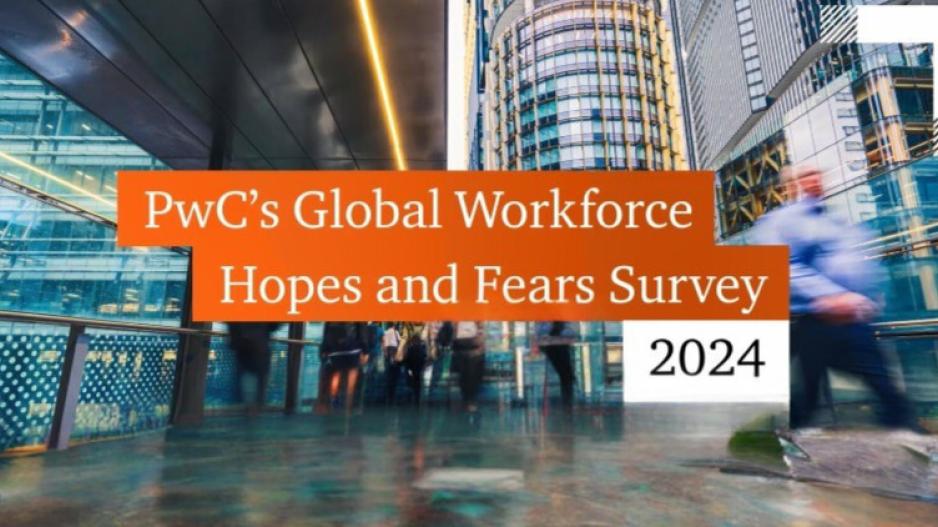PwC 2024 Global Workforce Hopes & Fears Survey
Workers Embrace AI and Prioritize Skills Growth Amid Rising Workloads And an Accelerating Pace of Change
-
Almost half (45%) of workers say their workload has increased significantly in the past year, as almost two-thirds (62%) say the pace of change at work has increased over the same time
-
More than one-quarter (28%) say they are very or extremely likely to switch employer in the next 12 months – a higher proportion than during the ‘Great Resignation’ (19%) in 2022
-
Employees prioritize skills-growth: fewer than half (46%) strongly or moderately agree that their employer provides adequate opportunities to learn new skills. This is particularly important for workers considering leaving: two-thirds (67%) say opportunities to learn new skills are a key factor in any decision to job-switch
-
More than 80% of workers who use generative AI daily expect it to make their time at work more efficient in the next 12 months. Half (49%) of all users expect it to lead to higher salaries
Among more than 56,000 workers across 50 countries and territories, many say they are prioritizing long-term skills growth to accelerate their careers amid rising workloads and heightened workplace uncertainty, according to PwC’s 2024 Global Workforce Hopes & Fears Survey.
In the last 12 months, workers say they have experienced rising workloads (45%) and an accelerating pace of workplace change. Nearly two-thirds (62%) say they have experienced more change at work in the past year than the 12 months prior, with two-fifths (40%) noting their daily responsibilities have changed to a large or very large extent. Almost half (44%) don’t understand the purpose of changes taking place.
In the midst of this growing mix of employee pressures, the findings suggest workers are alert to opportunities elsewhere, and are highly focused on skills growth and embracing AI.
More than one-quarter (28%) say they are likely to switch employers in the next 12 months, a percentage far higher than during the ‘Great Resignation’ (19%) of 2022. Two-thirds (67%) of those considering moving say skills is an important factor in their decision to stay with their current employer or switch to a new one.
As employees face heightened workplace pressures, they are also turning to new and emerging technologies such as GenAI to help. Among those employees who use GenAI daily, 82% expect it to make their time at work more efficient in the next 12 months.
Employees are also optimistic about opportunities for GenAI to support their growth. Half (49%) of all users expect GenAI to lead to higher salaries – an expectation that’s even higher (76%) among employees who use the technology daily. More than 70% of users agree that GenAI tools will create opportunities to be more creative at work (73%) and improve the quality of their work (72%).
Workers are placing an increased premium on skills growth to mitigate their concerns and accelerate their careers. Employees who say they are likely to switch employers in the next 12 months are nearly twice as likely to strongly consider upskilling in that decision than workers planning to stay (67% vs. 36%). This comes as fewer than half (46%) of all employees moderately or strongly agree that their employer provides adequate opportunities to learn new skills that will be helpful to their careers.
Employees who are likely to leave in the next year may be more attuned to skills changes that are needed than the general workforce, with 51% moderately or strongly agreeing that the skills their job requires will change in the next five years (vs. 29% of those unlikely to change employer).
There is particular interest in the impact of AI on skills development, with 76% of all users expecting it to create opportunities to learn new skills at work. However, employers will need to invest heavily in new and emerging technology training and access. Among employees who have not used GenAI at work in the last 12 months, one-third (33%) don’t think there are opportunities to use the technology in their line of work, while 24% don’t have access to the tools at work, and 23% don’t know how to use the tools.
Despite the pace of change, there are also signs of optimism and engagement at work. 60% of workers expressed at least moderate job satisfaction (up from 56% in 2023) while more than half (57%) of employees who view fair pay as important agree that their job is fairly paid. Cost-of-living pressures have slightly eased since 2023 (the proportion of workers with money left over each month has risen to 45%, up from 38%). However, more than half (52%) say they are still financially stressed to some degree.






